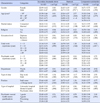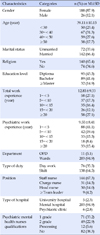Abstract
Purpose
The purpose of this study was to identify the effects of secondary traumatic stress and compassion satisfaction on burnout in psychiatric nurses and the moderating effects of social support.
Methods
The participants were 214 psychiatric nurses from G city & C, G, J province. Data were collected from October 23 to November 6, 2015 and analyzed using t-test, ANOVA, Pearson correlation coefficients, multiple regression analysis and moderated regression analysis.
Results
Secondary traumatic stress and compassion satisfaction had significant influence on burnout in psychiatric nurses. The explained variance for burnout was 67%. However, social support did not moderate the effect of secondary traumatic stress and compassion satisfaction on burnout.
Conclusion
Findings indicate that burnout in psychiatric nurses may have a direct influence on their nursing services. There is a need to provide nursing intervention programs in order to prevent and alleviate burnout in psychiatric nurses by decreasing secondary traumatic stress and increasing compassion satisfaction.
Figures and Tables
Table 2
Secondary Traumatic Stress, Burnout, and Compassion Satisfaction according to General Characteristics (N=214)

References
1. Yang YK. Effects of ego-resilience and work environment on job satisfaction in psychiatric nurses. J Korean Acad Psychiatr Ment Health Nurs. 2015; 24(4):226–235. DOI: 10.12934/jkpmhn.2015.24.4.226.

2. Lee NH. A study on the relationship among self-efficacy of psychiatric nurses, job stress and burnout. Nurs Sci. 2011; 23(2):47–59.
3. Whitebird RR, Asche SE, Thompson GL, Rossom R, Heinrich R. Stress, burnout, compassion fatigue, and mental health in hospice workers in minnesota. J Palliat Med. 2013; 16(12):1534–1539. DOI: 10.1089/jpm.2013.0202.

4. Baik DW, Yom YH. Effects of social support and emotional intelligence in the relationship between emotional labor and burnout among clinical nurses. J Korean Acad Nurs Adm. 2012; 18(3):271–280.

5. Robins PM, Meltzer L, Zelikovsky N. The experience of secondary traumatic stress upon care providers working within a children's hospital. J Pediatr Nurs. 2009; 24(4):270–279. DOI: 10.1016/j.pedn.2008.03.007.

6. Stamm BH. 2010 The concise ProQOL manual [Internet]. 2010. cited 2016 Aug 10. 1–77. Available from: http://www.proqol.org/uploads/ProQOL_Concise_2ndEd_12-2010.pdf.
7. Abendroth M, Flannery J. Predicting the risk of compassion fatigue: a study of hospice nurses. J Hosp Palliat Nurs. 2006; 8(6):346–356.
8. Lee HJ, Min HS. The influential factors on compassion fatigue in hospital nurses. J Muscle Joint Health. 2014; 21(3):236–245.

9. Jeon SY. Factors influencing compassion fatigue in emergency
department nurses [master's thesis]. Busan: Pusan National University;2012. 63.
10. Kim S, Kim JH, Park JY, Suh EY, Yang HJ, Lee SY, et al. Oncology nurses' professional quality of life in a tertiary hospital. J Korean Clin Nurs Res. 2010; 16(3):145–155.
11. Meadors P, Lamson A, Swanson M, White M, Sira N. Secondary traumatization in pediatric healthcare providers: compassion fatigue, burnout, and secondary traumatic stress. Omega (Westport). 2010; 60(2):103–128. DOI: 10.2190/OM.60.2.a.

12. Bercier ML, Maynard BR. Intervention for secondary traumatic stress with mental health workers: a systematic review. Res Soc Work Pract. 2015; 25(1):81–89. DOI: 10.1177/1049731513517142.
13. Sahraian A, Fazelzadeh A, Mehdizadeh AR, Toobaee SH. Burnout in hospital nurses: a comparison of internal, surgery, psychiatry and burns wards. Int Nurs Rev. 2008; 55(1):62–67. DOI: 10.1111/j.1466-7657.2007.00582.x.

14. Shin HJ, Kim KH. Emotional labor and professional quality of life in Korean psychiatric nurses. Health Soc Welf Rev. 2015; 35(4):190–216. DOI: 10.15709/hswr.2015.35.4.190.

15. Stamm BH. Measuring compassion satisfaction as well as fatigue: developmental history of the compassion fatigue and satisfaction test. In : Figley CR, editor. Treating compassion fatigue. New York: Brunner-Routledge;2002. p. 227. .
16. Jeong SL, Lee EN, Song YS. The main and buffering effects of perceived social support on burnout of insurance review nurses. J Korean Acad Admin. 2006; 12(3):482–490.
17. Sargent LD, Terry DJ. The moderating role of social support in Karasek’s job strain model. Work Stress. 2000; 14(3):245–261. DOI: 10.1080/02678370010025568.

18. Spence Laschinger HKS, Nosko A, Wilk P, Finegan J. Effects of unit empowerment and perceived support for professional nursing practice on unit effectiveness and individual nurse well-being: a time-lagged study. Int J Nurs Stud. 2014; 51(12):1615–1623. DOI: 10.1016/j.ijnurstu.2014.04.010.

19. Lee EJ, Jung IH. A study on the moderating effect of social support and job autonomy on relationship between workaholism and job burnout. Korea Assoc Bus Edu. 2012; 27(6):27–53.
20. Yom YH, Kim HJ. Effects of compassion satisfaction and social support in the relationship between compassion fatigue and burnout in hospital nurses. J Korean Acad Nurs. 2012; 42(6):870–878. DOI: 10.4040/jkan.2012.42.6.870.

21. Jang YM, Kim SY. Coping strategies, compassion fatigue and compassion satisfaction among nurses in emergency room. J Korean Clin Nurs Res. 2014; 20(3):348–358.
22. Kim KH. The relationship of self-efficacy and social support on burnout of insurance review nurses [master's thesis]. Seoul: Hanyang University;2008. 62.
23. Kim J, Lee TW. The influence of nursing practice environment, compassion fatigue and compassion satisfaction on burnout among clinical nurses. J Korean Clin Nurs Res. 2016; 22(2):109–117.
24. Choi MJ. A comparative study on the empathic ability and job satisfaction of psychiatric nurses and general ward nurses. [master's thesis]. Seoul: Kyung Hee University;2005. 30.
25. AbuAIRub RF, Omari FH, Abu Al Rub AF. The moderating effect of social support on the stress-satisfaction relationship among Jordanian hospital nurse. J Nurs Manag. 2009; 17(7):870–878. DOI: 10.1111/j.1365-2834.2009.01007.x.
26. Gray-Stanley JA, Muramatsu N. Work stress, burnout, and social and personal resources among direct care workers. Res Dev Disabil. 2011; 32(3):1065–1074. DOI: 10.1016/j.ridd.2011.01.025.

27. Lin HS, Probst JC, Hsu YC. Depression among female psychiatric nurses in southern taiwan: main and moderating effects of job stress, coping behavior and social support. J Clin Nurs. 2010; 19(15-16):2342–2354. DOI: 10.1111/j.1365-2702.2010.03216.x.

28. Lee SK, Yun TS, Lee SY. Moderating role of social support in the stressor-satisfaction relationship: evidence from police officers in Korea. Int Rev Public Adm. 2015; 20(1):102–116.

29. Kim IS. The role of self-efficacy and social support in the relationship between emotional labor and burn out, turn over intention among hospital nurses. J Korean Acad Nurs Adm. 2009; 15(4):515–526.
30. Pearson GS. Psychiatric nurses and secondary trauma. Perspect Psychiatr Care. 2012; 48(3):123–124. DOI: 10.1111/j.1744-6163.2012.00341.x.





 PDF
PDF ePub
ePub Citation
Citation Print
Print






 XML Download
XML Download